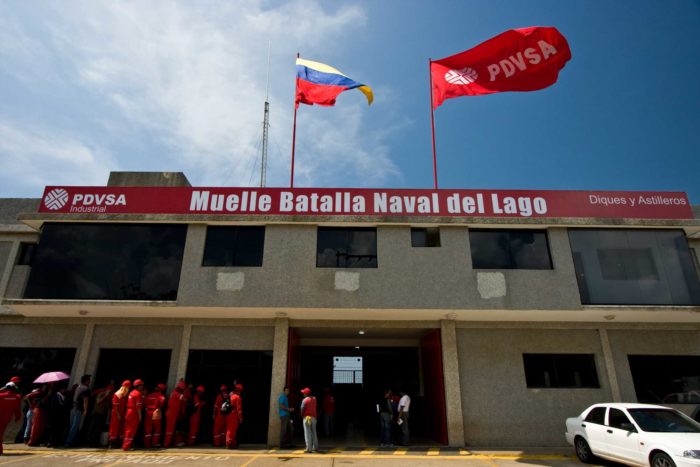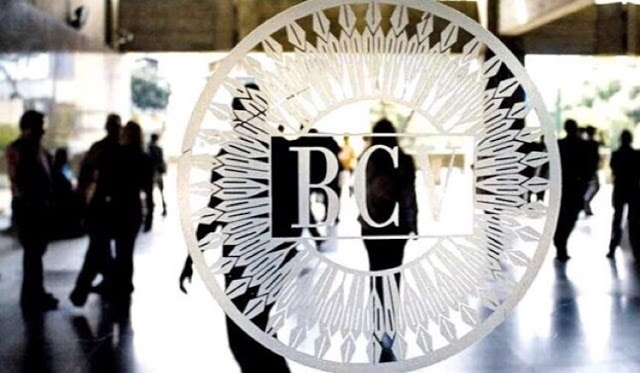Translated for LAB by Fuschia Fowke
Regardless of who is in power in Venezuela in the next few years, the government in office will have to face up to the loss of the social, political and economic control it gained from oil revenue. Hence the struggle between Maduro and Guaidó to gain control of Venezuela’s funds, which are currently blocked by international banks.
On 28 January 2019, the White House issued Executive Order 13,850 which blocked all the assets and interests, subject to USA jurisdiction, of the Venezuelan state-owned oil company PDVSA (Fundación Petróleo de Venezuela). On 5 August, Trump also issued executive order 13,884 which froze all Venezuelan assets in the USA. CITGO, a US-based oil company, part-owned by PDVSA, is about to be auctioned off to meet the demands of its 2020 bondholders: Crystallex and ConocoPhillips. On top of this, the gold reserves held by the Bank of England and the Deutsche Bank cannot be used by either Maduro or Guaidó – the Bank of England froze almost one thousand million euros from the reserves of the BCV (Banco Central de Venezuela) and Deutsche Bank froze one hundred and twenty million euros, as a result of a gold trade exchange contract. Despite the fact that the Asamblea Nacional and the Trump Administration have granted Guaidó control of these funds and assets, it has not been easy for him to use them because they remain blocked.

According to calculations by Petroleum of Venezuela Corporation and the analytics company, Hinterlaces, the total of Venezuelan resources blocked abroad amounts to an estimated $5,470 million. This figure matches the calculations of Guaidó’s team. Guaidó’s representative in the United Kingdom, Vanessa Neumann, has revealed that more than 5,000 million dollars of Venezuela’s wealth is currently blocked abroad – a situation which is being challenged by Maduro’s Government. José Ignacio Hernández, until recently Special Prosecutor for Guaidó, has also revealed that there are proceedings taking place in Europe to seize control of Venezuelan public assets and remove control of public money from Maduro. In London, two trials are taking place; in Portugal proceedings related to accounts with NovoBanco are underway and in Spain there is a fight for the assets of CVG International, which have been blocked by the Spanish banks CaixaBank, Sabadell and Cajamar.
Although the UK Government recognises Guaidó as the legitimate president of Venezuela, the Bank of England has requested clarification to determine who should be granted control of the country’s assets. The court’s ruling in this litigation will set a precedent for other banks to release funds to the favoured party and as such would give rise to a mandate of sorts, given that if the Bank of England releases the funds to the Guaidó Administration, other central banks will be guided by this to transfer other blocked funds.
Video: Al Jazeera, 23 June 2020
This would ultimately remove power from Maduro, who would lose control of funds from Venezuela’s assets and from state-owned companies abroad. A ruling in favour of Guaidó would also pave the way for the interim government to take control of appropriated funds (which are currently blocked in Andorra, Switzerland, Holland and other countries) away from Chavez and Maduro’s corrupt governmental officials, without long and onerous trials.
According to calculations by the Fundación Petróleo de Venezuela, a ‘Humanitarian Petroleum Agreement’ could generate an annual income of $8 billion. This could be used to help the humanitarian crisis, through a scheme which would enable Venezuela to regain its place in the international petroleum market, so long as that income is administered by international institutions involved in the health crisis, the UNDP, WHO, Pan-American Health Organisation (PAHO) and International Red Cross. The resources would be assigned to purchasing essential goods: the distribution of which would be through depoliticised mechanisms, in order to prevent them being used as patronage.
Funding for failure
But Venezuela is a failed state which doesn’t work. The political elites, fighting for power, are incapable of reaching an agreement on a basic programme of national interest which could avert the Covid-19 health emergency and prevent it from becoming a catastrophe. The Maduro government is becoming increasingly ineffective and Guaidó’s interim commissioners, ambassadors and special attorneys have been unable to resolve a single concrete problem. They have not even been able to provide the one hundred dollars which they promised to medical personnel who placed their lives in danger in face of the coronavirus pandemic.
Despite the backing of Trump and more than fifty governments for over a year, Guaidó has not achieved a single victory within the country and his performance is becoming increasingly erratic. His credibility has been greatly reduced by events such as:
- the failure of the attempted coup on 30 April 2019
- signing the agreement which later resulted in the failed Operación Gedeón
- loss of control of the National Assembly
- inefficiency when it came to the use of Venezuela’s funds abroad.
It is not only Guaidó’s opponents who think this way – Bolton’s book reveals Trump’s doubts about Guaidó’s skills and abilities and this revelation was later confirmed by Trump in an interview with the American news website, Axios.
Neither Maduro nor Guaidó can provide a guarantee of the clean and transparent handling of public funds which Venezuela needs in order to avert the threat of the pandemic. Governments, multinational corporations, law firms and courts in other countries, apathetically watch this tragedy taking place – in some cases even taking advantage of it.
The division of opinion within the international community as to who constitutes the legitimate government of Venezuela has been used as an excuse to deny requests for funding from the IMF, and for blocking Venezuela’s assets, the BCV’s gold reserves, and the bank accounts of the Venezuelan state abroad. This scam (not knowing which government is in control of Venezuela’s institutions) has led to the plundering of Venezuela’s wealth, which now cannot be used by either Maduro or Guaidó to avert the threat of coronavirus.
Who will ever be able to measure the outcomes of such international pressure on Venezuela, an oppressed and depleted country suffering a humanitarian crisis?

